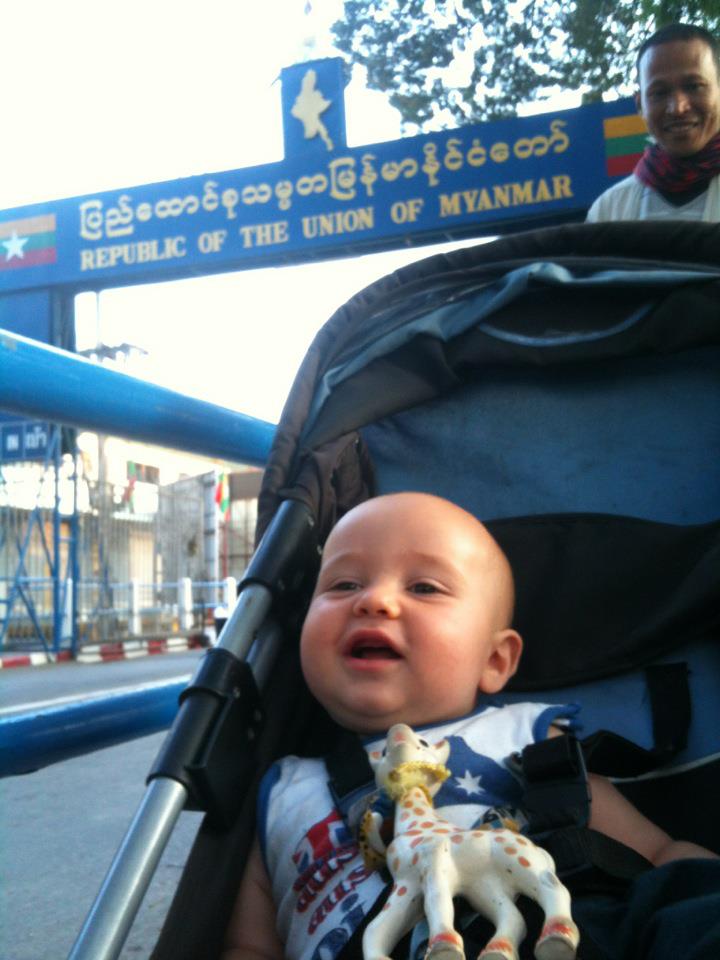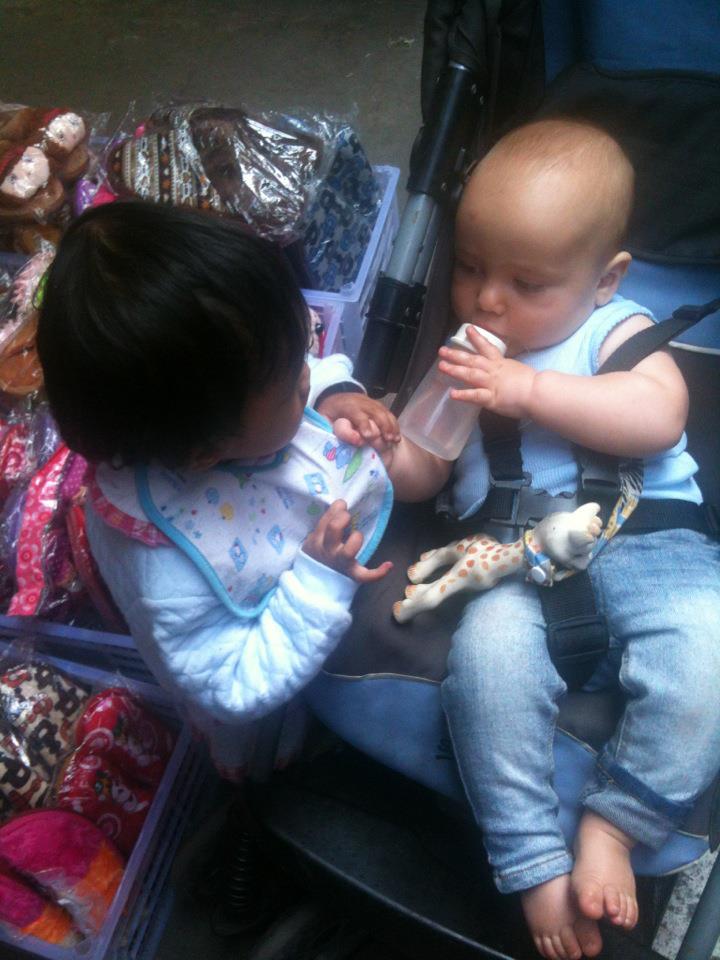Parshas Yisro: Blessing G-d for Miracles
Yesterday I encountered so many miracles I can’t even count them.

Akiva at the Myanmar (Burmese) border
It wasn’t such an extraordinary day, really. I had to take Akiva on the long bus journey from where we are staying in Thailand to the northernmost border, then cross into Burma and come back again. Backpacking or traveling with a baby or an infant can be challenging on an easy day. Sitting on several busses for a total of about 10 hours (I almost wrote ‘years’ – it kind of felt like that!) with a very active infant is no joke and not my idea of a fun way to spend my day. Not only that, but although Thai people (especially women) are usually in love with babies and always want to hold and play with them (and give me a break), I was seated next to a sourpuss who refused even to look at my adorable little cherub. Then, to top it all off, I got caught in a rain shower with no way to cover the stroller (or myself).
But then again, it was a really fantastic day and when I finally arrived back at my guesthouse, I was smiling from ear to ear. Why?
It’s all about what miracles you see. G-d sends us miracles constantly, but we often overlook them, calling them “nature” or “coincidence” or even “luck.” Well, my friends, let me tell you: nature was created and is controlled and maintained by G-d; coincidence simply doesn’t exist, but is G-d’s hand in the world; and luck is what happens when G-d sends something good your way. At its core, everything is G-d’s will and if we look at it that way, we will start to see “coincidences” and “good luck” as miracles and blessings. It’s an attitude that will create joy and gratitude in your life, which, today’s happiness gurus tell us, will make us happier people and more likely to live longer lives. Coincidence? I think not!

Akiva holding hands with a new Burmese friend... it it always such a blessing when I see him enjoying interactions with the local people! Read more about Traveling & Backpacking with a Baby or Infant: Making Local Friends. Read more about Traveling & Backpacking with a Baby or Infant: Mom Makes Local Friends, Too! Read more about Traveling & Backpacking with a Baby or Infant: Top 10 Reasons for your Baby to Play with the Locals (Part 1 – Benefits for Parents). Read more about Traveling & Backpacking with a Baby or Infant: Top 10 Reasons for your Baby to Play with the Locals (Part 2 – Physical Benefits for Baby). Read more about Traveling & Backpacking with a Baby or Infant: Top 10 Reasons for your Baby to Play with the Locals (Part 3 – Mental & Emotional Benefits for Baby). LINKS AT BOTTOM OF POST.
You see, Akiva was in a great mood when I woke him up yesterday morning at 5 AM. We took a tuktuk (auto-rickshaw) to the bus station and he laughed the whole time (he loves tuktuks!). Once we got on the bus, he went right to sleep, without even nursing, and then proceeded to sleep nearly the entire bus ride to the border. He was great when we went through security and immigration, ate a bit without complaint, and even fell asleep while I was walking around the market in Myanmar. The goods in Myanmar were mostly poor quality and not to my taste, so I wasn’t really tempted to spend any money, which is good (I already did too much shopping in Thailand!). The people were nice and friendly and the men selling cigarettes helped me up and down the stairs with the stroller. (It was amusing that when they tried to sell me the cigarettes, I told them Akiva was too young for them… their faces were priceless!) I got a good seat on a van I needed to take and I had good seats on both of my busses. Akiva was very active in the van, but hardly cried at all. I ran into some Thai people I knew when I was in Chiang Rai and they played with Akiva for a few minutes and gave me a break. I got some mango for a good price. On my bus back, the man with the seat next to mine moved to another seat so I could have more space with the baby and once again, Akiva slept for half the bus ride. When he was awake, he played nicely and ate some food (I think he was happy to have his own seat to play in!). When we arrived at the bus station, I ran into two good Thai friends, who I hadn’t expected to see again before leaving, so it was a great surprise and I was really excited to see them. I trust them, so I was able to leave Akiva with them and use the bathroom (what a luxury!). Then, on the truck back to my guesthouse, there were 2 Spanish guys, so I was able to give them some advice and, more importantly, speak some Spanish. When I got back to the guesthouse, the women here were so excited to see us that they played with Akiva for 15 minutes or so, while I had some time to unwind.
Now, none of those things are really ‘shocking.’ G-d didn’t come split the Red Sea for me or anything. But it made my day go more smoothly and more pleasantly. And because I looked for them and recognized them, I saw them as miracles. For that, I have to thank HaShem (G-d).
We get that precedent in this week’s parsha. In fact, to our shame, it is a non-Jew who teaches us gratitude to G-d. Yisro, Moshe (Moses) Rabbeinu’s father-in-law, comes along and says, “Blessed is HaShem, Who Saved you from the hand of Egypt and Pharoah, that He Saved the people from being subjugated by the hand of Egypt.” Wow, up until then, the Jewish people hadn’t even blessed G-d for what He had done for us! Sure, Miriam and the women sang His praise, but actually blessing Him? Outright thanking Him for His direct intervention?
Today, scientists have uncovered some evidence of the plagues in Egypt. They have found ways to attribute them all to natural causes, such as volcanic eruptions. G-d didn’t necessarily circumvent the laws of nature to create the plagues. So the Jews might just have taken it somewhat for granted. Just as we often do today, they could have called it “luck” or “coincidence.” Yisro had to come along and cultivate an attitude of gratitude. Yisro had to teach us to see and acknowledge the miracles.
Let’s not lose hold of this lesson. Every day is a miracle, every day is full of blessings. We just have to look and see them. Let’s thank G-d for everything he is doing for us, every moment of every day!
Shabbat Shalom!
Read more on Parshas Yisro: Keeping the Sabbath – Even While Traveling!
Read more about Traveling & Backpacking with a Baby or Infant: Making Local Friends.
Read more about Traveling & Backpacking with a Baby or Infant: Mom Makes Local Friends, Too!
Read more about Traveling & Backpacking with a Baby or Infant: Top 10 Reasons for your Baby to Play with the Locals (Part 1 – Benefits for Parents).
Read more about Traveling & Backpacking with a Baby or Infant: Top 10 Reasons for your Baby to Play with the Locals (Part 2 – Physical Benefits for Baby).
Read more about Traveling & Backpacking with a Baby or Infant: Top 10 Reasons for your Baby to Play with the Locals (Part 3 – Mental & Emotional Benefits for Baby).
Read More











